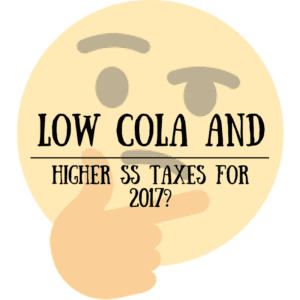 A meager 0.3 percent Cost of Living Adjustment (COLA) increase is on the horizon for January 2017. In contrast, there are sharp rises in premium costs of FEHB, FLTCIP, and Medicare premiums. With the exception of no increase in the years of 2010, 2011, and 2016, this is the smallest COLA increase on record.
A meager 0.3 percent Cost of Living Adjustment (COLA) increase is on the horizon for January 2017. In contrast, there are sharp rises in premium costs of FEHB, FLTCIP, and Medicare premiums. With the exception of no increase in the years of 2010, 2011, and 2016, this is the smallest COLA increase on record.
Medicare Part B
About 30 percent of beneficiaries will see a large increase in their Medicare Part B premiums. On the contrary, the others under the ‘hold harmless’ provision of the Social Security Act, the rise in premiums won’t be as drastic. The ‘hold harmless’ provision states that the dollar increase in Medicare Part B premiums is limited to the dollar increase in a person’s Social Security benefit. Meaning their premiums will only increase in proportion to the increase in their Social Security checks. The COLA determines how much certain retirees will be able to offset the rise in their Medicare premiums.
COLA Calculations
By law, the COLA relies on the Consumer Price Index for Urban Wage Earners and Clerical Workers, or CPI-W. It is a broad measure of consumer prices generated by the Bureau of Labor Statistics. It measures price changes for food, housing, recreation, education, clothing, energy, etc. COLA’s are calculated using the CPI-W for July, August, and September. The more prices have gone up, the higher the COLA will be. On the other hand, if prices decrease or remain the same, the COLA will stay the same.
A couple or organizations have spoken out about this small Cost of Living Adjustment.
NARFE (National Active and Retired Federal Employees Association) has said, “Not only is the COLA increase unrealistically low and not reflective of the expenses faced by seniors, hundreds of thousands of federal retirees enrolled in Medicare will see a significant decrease in their annuities for the second straight year, due to the so-called ‘hold-harmless’ provision of social security law.”
The AFGE (American Federation of Government Employees) said, “Prices for many items that seniors must purchase are rising faster than the overall inflation rate. Forcing this group of retirees to shoulder such a huge cost burden will have a devastating impact on their already modest living standards.”
COLA and Social Security
The COLA and Social Security benefits correlate to one another. So, it is necessary to point out that Social Security taxes will be rising for some in 2017. The Social Security Administration announced the maximum number of earnings subject to this tax would rise 7.3 percent. This is the largest jump in over three decades. This rise in taxes is said to generate almost $1100 per worker who reaches that maximum earnings limit.
To learn more about the 2017 COLA, please click here. To read more about the rise in Social Security taxes, click here.
If you are interested in learning about Federal Disability Retirement, please give our office a call to schedule a free consultation to see if you qualify.

